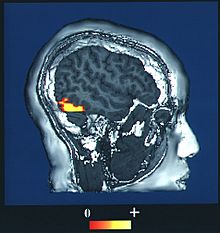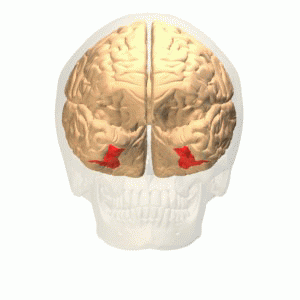Prosopagnosia facts for kids
Quick facts for kids Prosopagnosia |
|
|---|---|
| Synonyms | Face blindness |
 |
|
| The fusiform face area, the part of the brain associated with facial recognition | |
Prosopagnosia, also known as face blindness, is a condition where a person finds it very hard to recognize faces. This includes the faces of family, friends, and even their own face. Imagine not being able to tell who someone is just by looking at their face!
At first, experts thought prosopagnosia only happened after a brain injury. This type is called acquired prosopagnosia. It can be caused by damage to a part of the brain called the temporal lobe. This area is important for processing memories and recognizing things.
However, many people are born with prosopagnosia. This is called developmental or congenital prosopagnosia. It means they never learn to recognize faces properly. About 2.5% of people have this type. That's quite a lot! People with face blindness often learn to recognize others by their voice, how they walk, their hairstyle, or their clothes. There is currently no cure or treatment for prosopagnosia.
The opposite of prosopagnosia is having a super ability to recognize faces. People with this skill are sometimes called "super recognizers".
Contents
What Causes Face Blindness?
Prosopagnosia can happen for different reasons. Sometimes, it's caused by damage to the lower part of the brain. This damage is called a lesion. It can also be caused by nerve damage in this brain area. This is known as 'acquired prosopagnosia'.
Things that can cause acquired prosopagnosia include:
- Birth defects
- Carbon monoxide poisoning
- Encephalitis (when the brain becomes swollen)
- Diseases like Parkinson's disease or Alzheimer's disease
How Doctors Check for Prosopagnosia
Doctors can use special brain scans to see if someone has prosopagnosia. These scans include PET and fMRI scans. They show how the brain reacts when a person sees faces. If certain parts of the brain don't light up as expected, it can suggest prosopagnosia.
Is it Inherited?
For people born with prosopagnosia, it often runs in families. Scientists believe it might be caused by a change in a gene. This change can be passed down from parents to children. This is why it can be common in some families.
One interesting story is about a woman who couldn't recognize her own face. But she could recognize all objects and almost all animals, except for humans and chimpanzees! This shows how specific face blindness can be.
Related Information
- Alexithymia
- Amnesia
- Prosopamnesia
- Super recognizers
See also
 In Spanish: Prosopagnosia para niños
In Spanish: Prosopagnosia para niños


